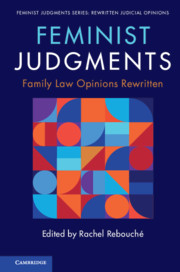Book contents
- Feminist Judgments: Family Law Opinions Rewritten
- Feminist Judgments Series Editors
- Advisory Panel for Feminist Judgments Series
- Feminist Judgments: Family Law Opinions Rewritten
- Copyright page
- Contents
- Advisory Panel for Feminist Judgments: Family Law Opinions Rewritten
- Contributors
- Acknowledgments
- 1 Introduction
- 2 Commentary on Reynolds v. United States
- 3 Commentary on McGuire v. McGuire
- 4 Commentary on Dandridge v. Williams
- 5 Commentary on Wisconsin v. Yoder
- 6 Commentary on Marvin v. Marvin
- 7 Commentary on Kulko v. Superior Court of California
- 8 Commentary on Daly v. Daly
- 9 Commentary on Michael H. v. Gerald D.
- 10 Commentary on DeShaney v. Winnebago County Department of Social Services
- 11 Commentary on Simeone v. Simeone
- 12 Commentary on Borelli v. Brusseau
- 13 Commentary on Turner v. Rogers
- 14 Commentary on In the Matter of the Parentage of a Child by T.J.S. and A.L.S.
- 15 Commentary on Matter of A-B-
- 16 Commentary on Sessions v. Morales-Santana
- Index
9 - Commentary on Michael H. v. Gerald D.
Published online by Cambridge University Press: 08 July 2020
- Feminist Judgments: Family Law Opinions Rewritten
- Feminist Judgments Series Editors
- Advisory Panel for Feminist Judgments Series
- Feminist Judgments: Family Law Opinions Rewritten
- Copyright page
- Contents
- Advisory Panel for Feminist Judgments: Family Law Opinions Rewritten
- Contributors
- Acknowledgments
- 1 Introduction
- 2 Commentary on Reynolds v. United States
- 3 Commentary on McGuire v. McGuire
- 4 Commentary on Dandridge v. Williams
- 5 Commentary on Wisconsin v. Yoder
- 6 Commentary on Marvin v. Marvin
- 7 Commentary on Kulko v. Superior Court of California
- 8 Commentary on Daly v. Daly
- 9 Commentary on Michael H. v. Gerald D.
- 10 Commentary on DeShaney v. Winnebago County Department of Social Services
- 11 Commentary on Simeone v. Simeone
- 12 Commentary on Borelli v. Brusseau
- 13 Commentary on Turner v. Rogers
- 14 Commentary on In the Matter of the Parentage of a Child by T.J.S. and A.L.S.
- 15 Commentary on Matter of A-B-
- 16 Commentary on Sessions v. Morales-Santana
- Index
Summary
In Michael H. v. Gerald D., the U.S. Supreme Court addressed a “marital presumption,”1 which established parental rights for the husband of a mother even if the husband is not the biological father. Writing for a plurality of the Court, Justice Scalia concluded that an evidentiary presumption that precludes a biological father from asserting parental rights does not violate the Due Process and Equal Protection Clauses of the Fourteenth Amendment. The case raised overarching but underacknowledged questions about how we define family, parenthood, motherhood, fatherhood, and children’s interests. The Antognini rewritten opinion elegantly grapples with these questions by uncovering the detrimental impacts on parents and children because of the marital presumption’s application in this case. Had an opinion like this prevailed, the legal regulation of the family would likely have progressed more quickly toward recognizing functional relationships over formal ones rooted solely in marriage. The opinion would also have ushered in deeper consideration of the role of gender and biology in legal determinations of parentage.
- Type
- Chapter
- Information
- Feminist Judgments: Family Law Opinions Rewritten , pp. 187 - 214Publisher: Cambridge University PressPrint publication year: 2020



